Beyond the Bend: Everything You Need to Know About 3/4 Black Iron Pipe
By Brian on November 20, 2025
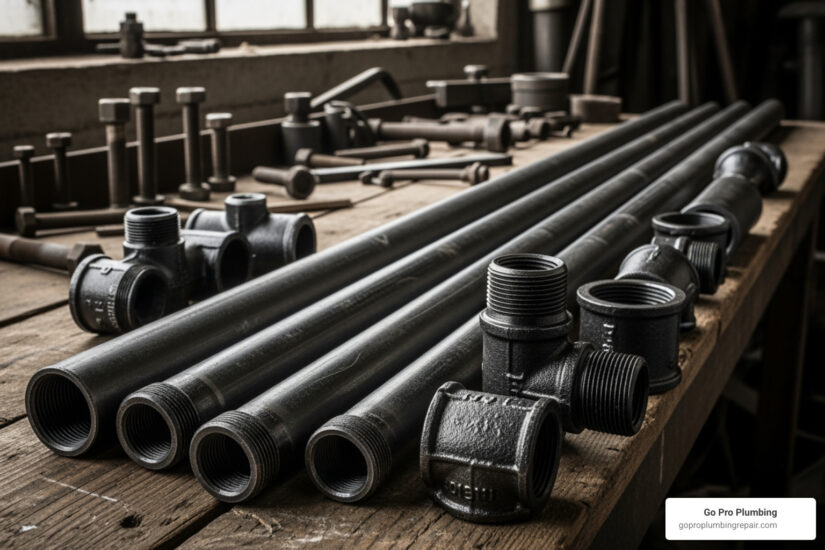
Why 3/4 Black Iron Pipe Remains a Top Choice for Homeowners and Professionals
3/4 black iron pipe is a versatile steel piping solution used for natural gas lines, steam transport, and industrial-style DIY furniture. Offering exceptional strength and durability, it’s an economical choice for contractors and homeowners alike.
Quick Buyer’s Guide:
- Price: Approx. $1.45 to $3.59 per foot ($14.50 to $32.34 for a 10-foot length).
- Where to Buy: Home Depot, Lowe’s, plumbing supply stores, and online retailers.
- Key Specs: 1.05″ outside diameter, 0.113″ wall thickness, 1454 psi max pressure, 650°F max temperature.
- Best For: Gas lines (natural gas, propane), steam, air, oil, and DIY projects.
This pipe complies with ASTM A53 Grade A standards and has a protective varnish to prevent oxidation. However, it is not suitable for potable water due to rust concerns. Its industrial aesthetic has made it popular for creative projects, as one customer noted: “I used this pipe as a DIY project for a curtain rod in my log home.”
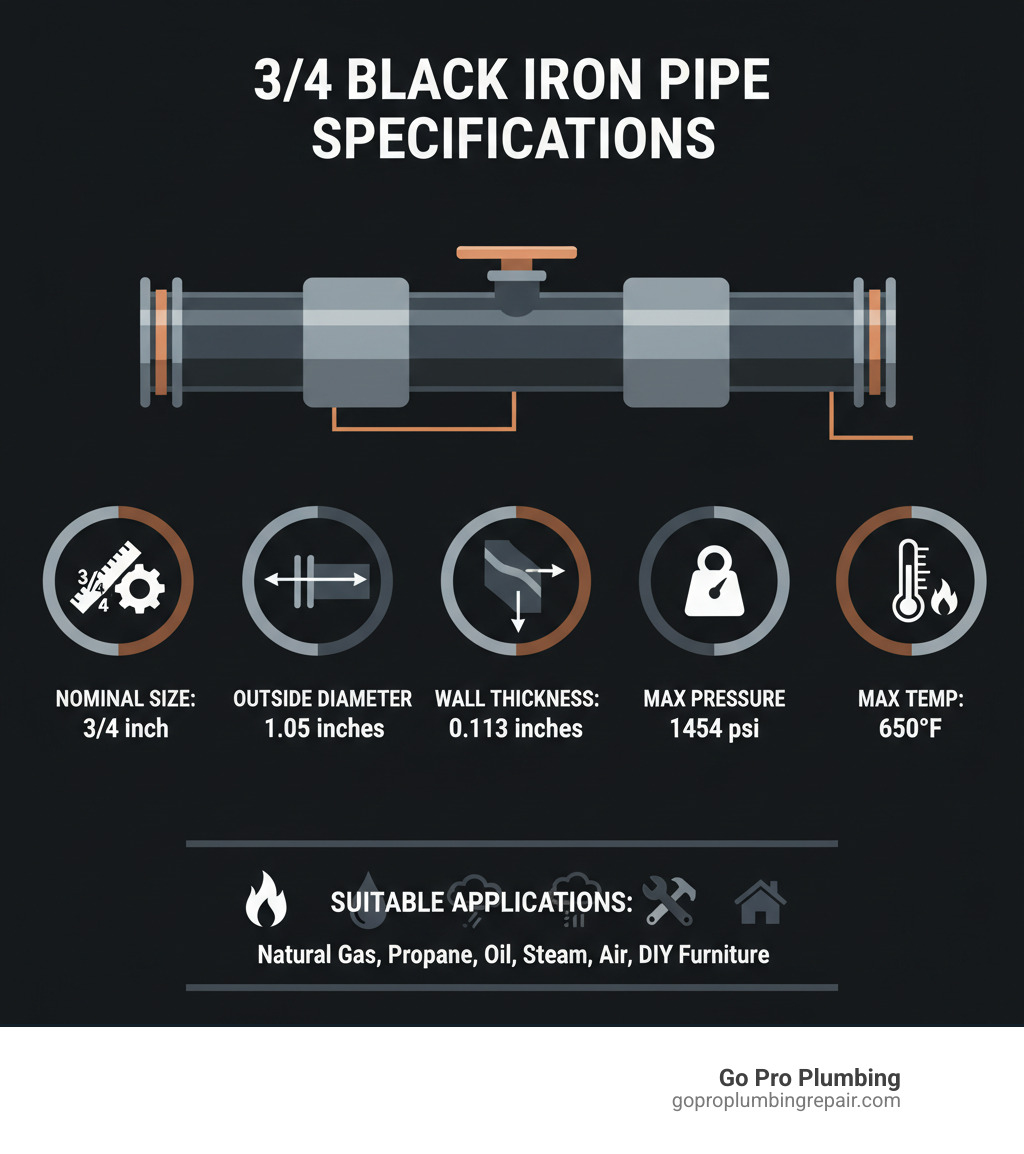
Understanding the Basics of 3/4 Black Iron Pipe
Despite its name, 3/4 black iron pipe is made of steel, not cast iron. Its black color comes from a dark iron oxide layer formed during manufacturing, which is then covered with a thin protective varnish to prevent rust before installation. This pipe is a type of “black steel pipe,” meaning it hasn’t been galvanized with a zinc coating. The absence of zinc is critical for gas lines, as flaking zinc from galvanized pipes can create dangerous blockages. This is why black iron pipe is the trusted standard for natural gas and propane installations.
Quality is assured through strict industry standards like ASTM A53 Grade A and ASME SA53, which govern the pipe’s chemical composition, mechanical properties, and dimensions. The threaded ends comply with ANSI B1.20.1 standards, ensuring secure, leak-free connections.
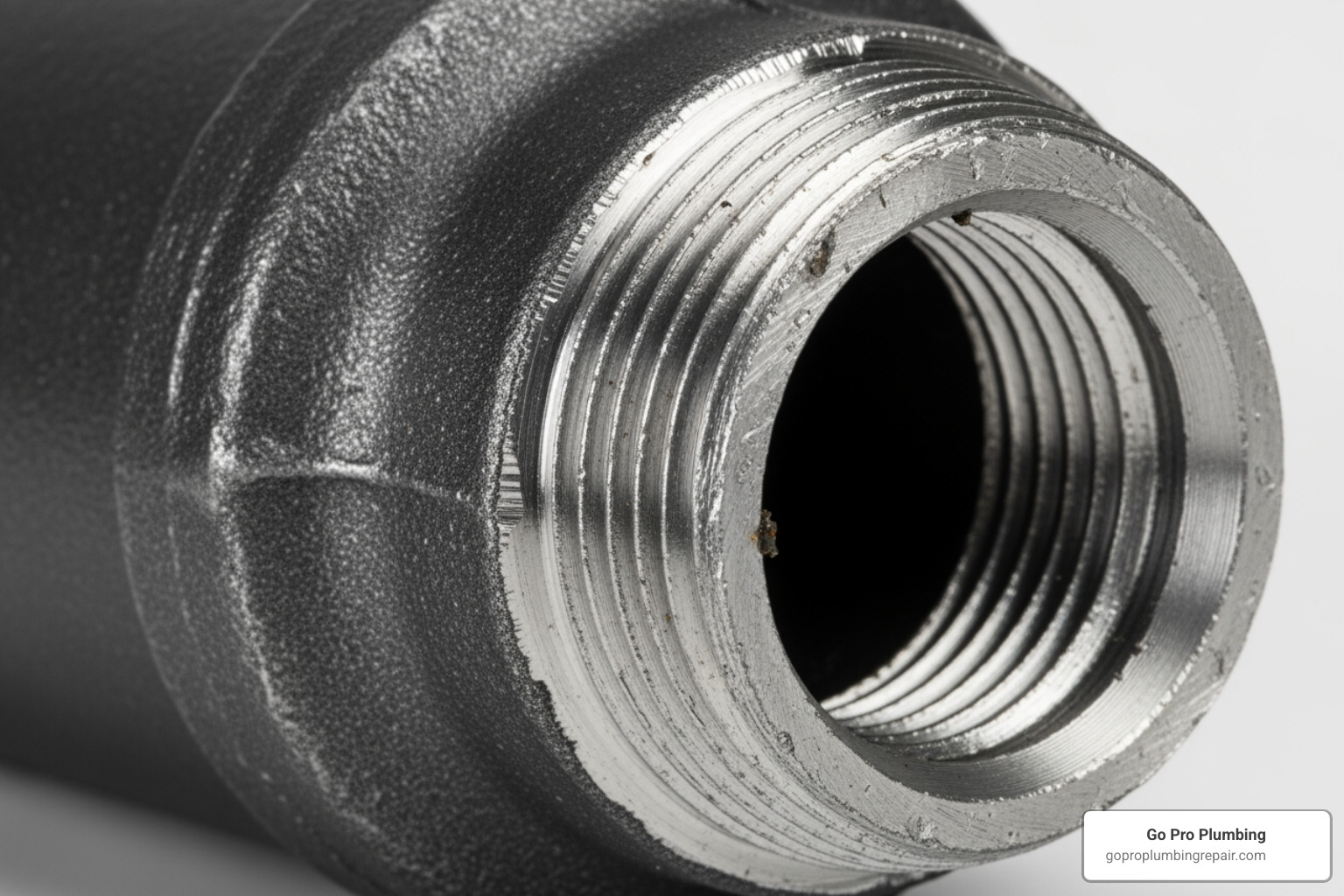
Key Specifications and Material Properties
The “3/4 inch” name is a nominal size; the pipe’s actual outside diameter is 1.05 inches. This is an important distinction for project planning. A standard Schedule 40 pipe has a wall thickness of 0.113 inches, and a 10-foot length weighs about 11.35 pounds. This weight is a key consideration for structural projects like shelving, which require adequate wall support.
The pipe’s performance ratings are impressive: a maximum working pressure of 1454 psi and a maximum temperature of 650°F. It remains reliable in cold temperatures down to -20°F. These specifications make it suitable for everything from residential gas fireplaces to industrial steam systems.
Where to Purchase Your Pipe
You can find 3/4 black iron pipe at several locations in Northern California.
- Hardware Stores: Retailers like Home Depot and Lowe’s are convenient, stocking various lengths and often providing in-store cutting and threading services.
- Plumbing Supply Houses: These specialized stores offer a wider selection of pipes and fittings and have expert staff who can answer technical questions.
- Metal Suppliers: Businesses like Metal Mart in Rancho Cordova and Del Paso Pipe and Steel in Sacramento offer competitive pricing, especially for bulk orders, and can handle custom cuts.
- Online Retailers: This option is best for smaller pieces or specialty fittings, as shipping long, heavy pipes can be expensive.
When purchasing, always confirm the pipe’s schedule (e.g., Schedule 40) and that it meets ASTM standards. Using the supplier’s cutting and threading services can save you time and the cost of specialized tools.
From Gas Lines to Bookshelves: Common Applications
The same 3/4 black iron pipe that safely delivers natural gas can also be the centerpiece of an industrial-style bookshelf. This dual identity highlights the pipe’s inherent strength and versatility, making it a rare material that is both functional for infrastructure and stylish for décor.
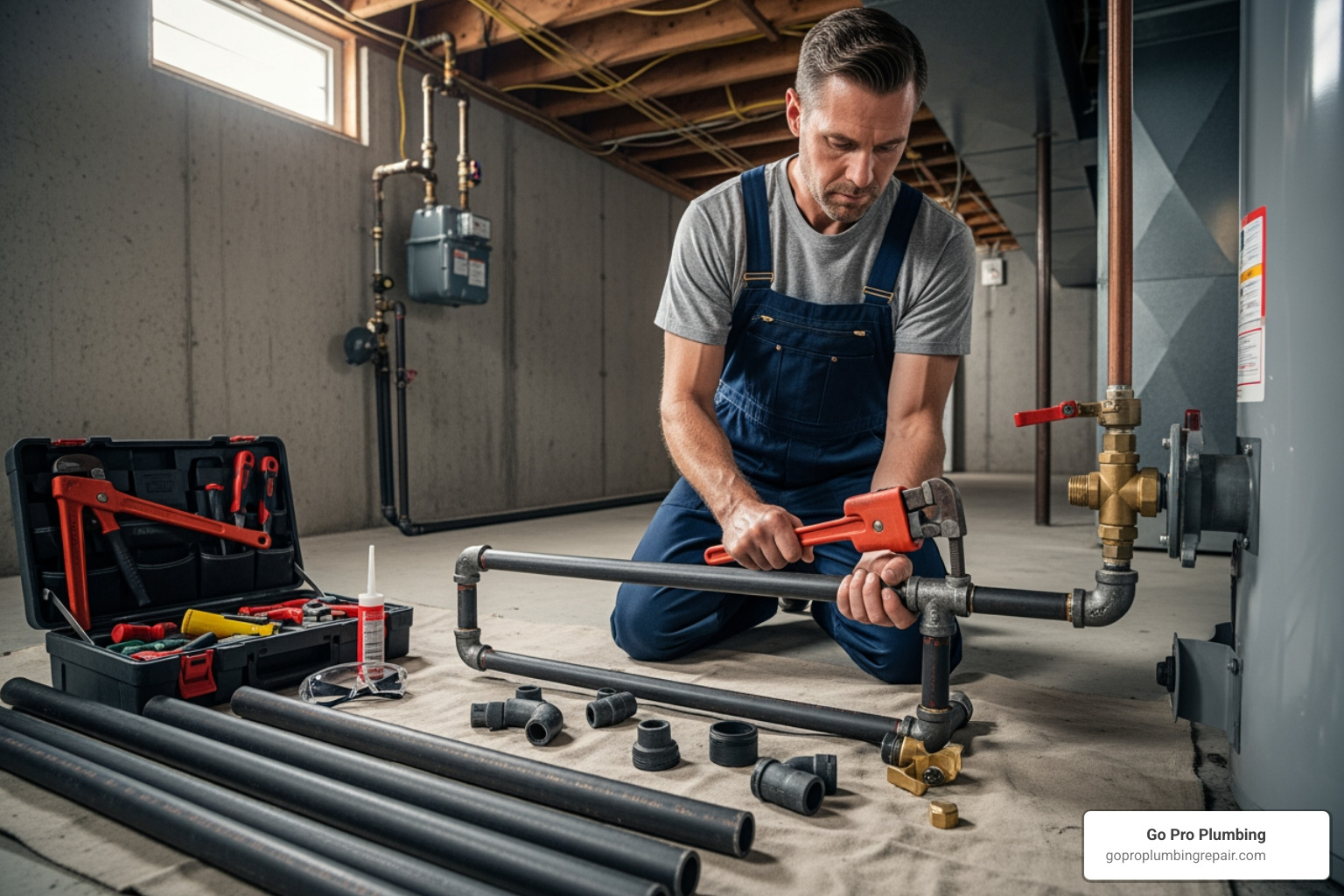
Professional and Industrial Uses
In its traditional role, this pipe is critical for infrastructure that keeps buildings running safely.
- Natural Gas and Propane Lines: As the standard in Northern California, its ungalvanized surface prevents flaking and ensures safe gas flow.
- Industrial Transport: Its high-pressure and 650°F temperature rating make it ideal for carrying steam, compressed air, and oil in factories and commercial buildings.
- Fire Sprinkler Systems: The pipe’s strength and pressure rating make it a reliable choice for these life-safety systems, where failure is not an option.
- Non-Potable Water: It is excellent for hydronic heating systems, but it must never be used for drinking water.
All professional installations must adhere strictly to local building codes. Our team at Go Pro Plumbing ensures every connection meets or exceeds these standards for safety and compliance.
Popular Home and Commercial Uses for 3/4 Black Iron Pipe
Designers and DIY enthusiasts have acceptd the raw, industrial aesthetic of 3/4 black iron pipe for a variety of creative projects.
- Industrial-Style Furniture: Pipe legs for coffee tables and desks offer genuine sturdiness and a sought-after utilitarian look.
- Bookshelves and Shelving: This material can support heavy loads without sagging, making it perfect for books or kitchenware.
- Curtain Rods: A pipe curtain rod adds character and can easily support heavy drapes without bending.
- Lighting Fixtures: It can be fashioned into unique industrial chandeliers, sconces, and lamps.
- Workshop Clamps: Woodworkers use lengths of pipe with clamp fixtures to create powerful, economical clamping tools.
For these projects, the pipe is typically cleaned and then sealed with a clear coat or paint to prevent rust while preserving its industrial appearance.
Making the Right Choice: Comparisons and Costs
Understanding the different types of 3/4 black iron pipe and how it compares to other materials can save you money and prevent project headaches.
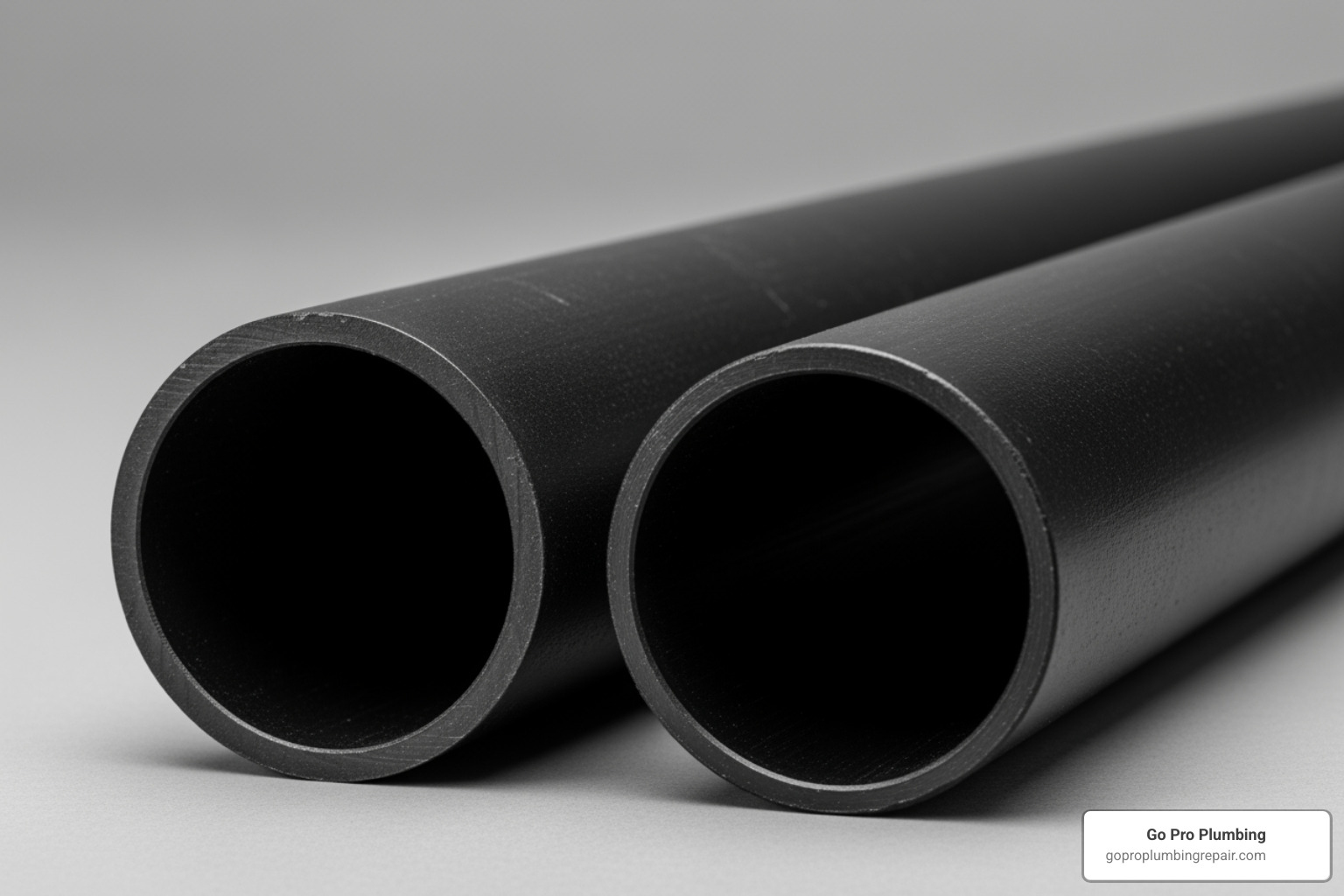
Schedule 40 vs. Schedule 80
The “schedule” number refers to the pipe’s wall thickness. A higher number means a thicker, stronger wall.
- Schedule 40: This is the standard for most residential and light commercial uses, including natural gas lines and DIY projects. It has a 0.113-inch wall, a 1454 psi pressure rating, and is the most common and economical option.
- Schedule 80: This is a heavy-duty option with a thicker wall (0.154 inches) for higher pressure ratings. It’s used in demanding industrial applications where extreme pressure or structural integrity is critical. It is heavier and more expensive.
For most residential gas lines in Northern California, Schedule 40 is the correct, code-compliant choice. Unless your project specifically requires the extra strength of Schedule 80, it’s an unnecessary expense.
Black Iron vs. Other Pipe Materials
Each piping material has its ideal use, and choosing the wrong one can be unsafe and costly.
- Galvanized Steel: While also steel, its zinc coating can flake off in gas lines, creating dangerous blockages. Black iron is the required choice for gas.
- Copper: The premium choice for drinking water lines due to its corrosion resistance. However, it is much more expensive and cannot handle the high pressures and temperatures that black iron pipe can.
- PEX: This flexible plastic tubing is popular for residential water lines because it’s inexpensive and easy to install. It is completely unsuitable for gas lines and lacks the rigidity for structural projects.
- PVC/CPVC: These plastic pipes are used for drainage (PVC) and some low-pressure water lines (CPVC). They have very low temperature and pressure ratings and cannot be used for gas, steam, or structural applications.
Black iron pipe’s unique advantage is its combination of strength, temperature/pressure resistance, and affordability. Its main trade-offs are its weight and susceptibility to rust when exposed to water, which is why it’s never used for potable water.
Typical Costs and What to Expect
3/4 black iron pipe offers professional-grade performance at a reasonable cost. Expect to pay between $1.45 to $4.83 per foot, with a standard 10-foot length costing $14.50 and $32.34.
Prices are influenced by several factors:
- Schedule: Schedule 80 costs more than Schedule 40.
- Length: Shorter, pre-cut and threaded pieces (nipples) cost more per foot but offer convenience.
- Retailer: Prices vary between big-box stores, plumbing suppliers, and metal distributors.
When budgeting, remember to include the cost of fittings like elbows, tees, and couplings. For current pricing in Northern California, check with local suppliers like Home Depot, Metal Mart in Rancho Cordova, or Del Paso Pipe and Steel in Sacramento.
Working with Black Iron Pipe: Safety and Best Practices
Working with 3/4 black iron pipe requires the right tools, techniques, and a focus on safety. This solid steel material demands respect, whether you’re a professional or a DIYer.
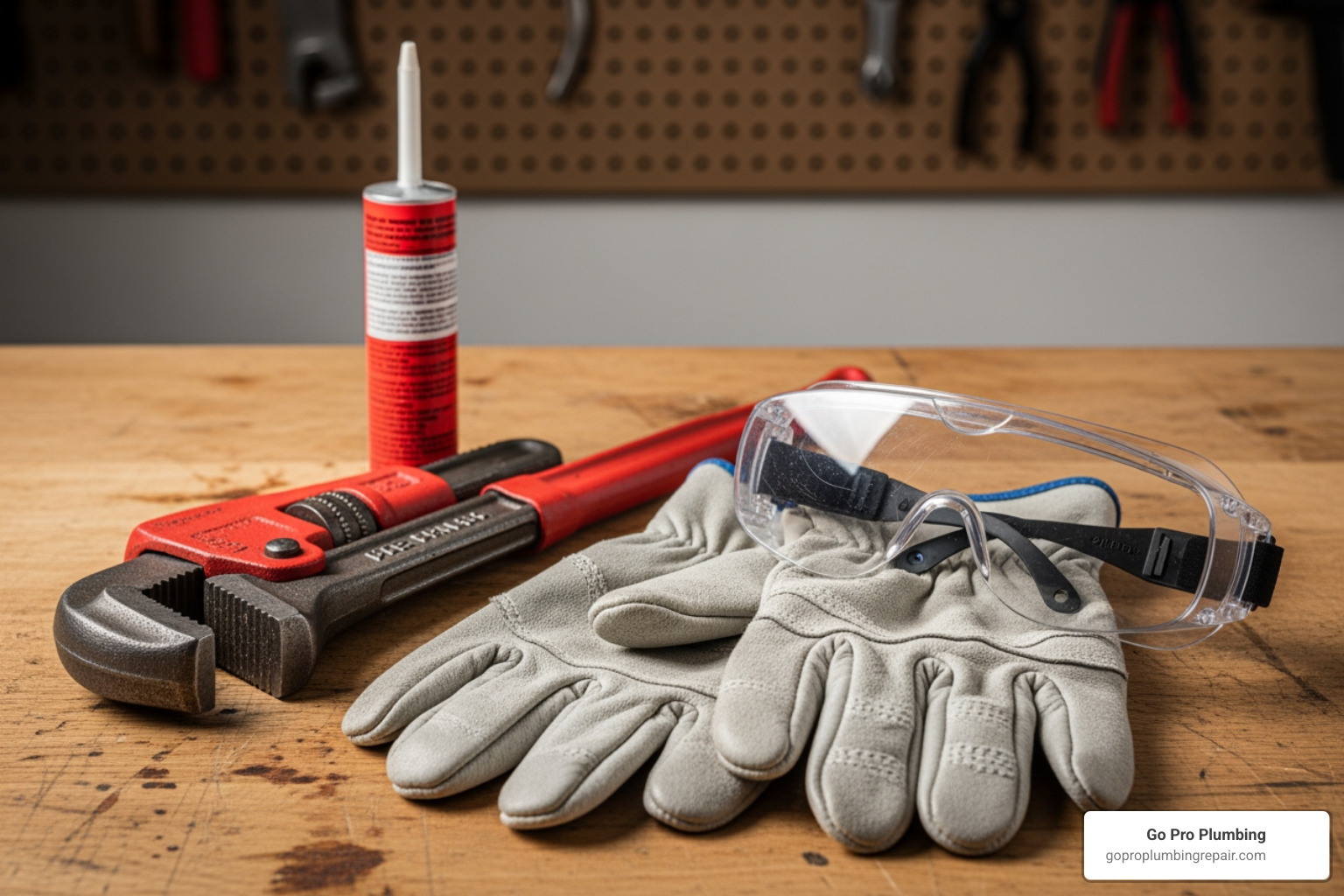
Essential Tools and Techniques
Having the right equipment is crucial for a successful project.
- Pipe Wrenches: You’ll need two—one to hold the pipe or fitting, and one to turn.
- Pipe Cutter: Provides clean, square cuts. A hacksaw can work, but a cutter is superior. Many hardware stores offer cutting services.
- Threading Tools: If cutting your own pipe, you’ll need a threading machine or manual dies to create proper, leak-free threads.
- Thread Sealant: For gas lines, use a high-quality thread sealant (“pipe dope”) rated for gas. This is not optional. PTFE tape can be used as well.
When assembling, hold the pipe securely in a vise. Tighten fittings firmly but do not over-tighten, as this can crack fittings or strip threads. Always measure twice and cut once.
Safety and Maintenance Considerations
Safety must be your top priority, especially with gas lines.
- Weight: A 10-foot length weighs over 11 pounds. Use proper lifting techniques and ensure any wall-mounted projects are securely anchored into studs.
- Inspection: Before use, inspect pipes for cracks, rusted threads, or debris inside.
- Cleaning and Sealing: For DIY projects, clean the factory varnish off with a degreaser. To prevent rust, seal the clean pipe with a clear coat, wax, or paint.
- Gas Line Work is for Professionals: Never attempt to install or repair a gas line yourself. The risks of leaks, fire, or explosion are too high. In Northern California, licensed professionals like Go Pro Plumbing must perform this work to meet safety codes.
- Do Not Bend: Black iron pipe is not designed to be bent. Bending compromises its structural integrity. Use 45-degree or 90-degree elbow fittings to change direction.
- Burying Pipe: If you need to bury pipe, you must check local plumbing codes. It often requires special protective wrapping to prevent corrosion from soil and moisture.
Frequently Asked Questions about 3/4″ Black Iron Pipe
Here are answers to the most common questions we receive about 3/4 black iron pipe.
Can you use 3/4 black iron pipe for drinking water?
No. You should never use black iron pipe for potable (drinking) water. It lacks a corrosion-resistant lining and will rust from the inside, leaching iron particles and contaminants into your water. This will affect the water’s taste and color, clog your plumbing, and lead to premature pipe failure. For drinking water, use approved materials like copper or PEX.
Can this pipe be bent?
No, it is strongly advised not to bend 3/4 black iron pipe. Bending weakens the pipe wall, creates stress points, and can cause micro-cracks, compromising its ability to handle pressure safely. This is especially dangerous in gas line applications and violates most plumbing codes. To change direction, always use the correct 45-degree or 90-degree elbow fittings, which are designed to maintain system integrity.
Can black iron pipe be buried underground?
This depends entirely on your local plumbing codes. While it is sometimes possible, burying black iron pipe exposes it to moisture and soil chemicals, which can cause rapid external corrosion and lead to dangerous leaks. If local codes in areas like Sacramento or Rancho Cordova permit it, they will mandate specific protective measures, such as factory-applied coatings, special wrapping, or burial in a sand bed. This work must be performed by a licensed professional. For gas lines, contact us for professional gas pipe replacement services to ensure it’s done safely.
Your Partner for Safe and Reliable Pipe Installation
We’ve covered the many uses of 3/4 black iron pipe, from its impressive strength in industrial applications to its surprising versatility in home décor. Its reliability and reasonable cost make it an excellent material for many projects.
While we encourage your creativity for DIY projects like furniture and shelving, we must emphasize that gas lines and other high-pressure systems are not a place for experimentation. A poorly installed gas line is a serious safety hazard. This is where professional expertise is absolutely essential.
At Go Pro Plumbing, we provide safe, reliable plumbing services to homes and businesses throughout Northern California, including Rancho Cordova and Sacramento. Our licensed professionals are experts in working with 3/4 black iron pipe for gas systems, strictly adhering to all local building codes to ensure your family’s safety. We pride ourselves on outstanding customer service and offer same-day availability for urgent needs.
Your safety is too important to leave to chance. If you need gas line installation, repair, or replacement, trust the professionals who get it right the first time. Contact us for professional gas pipe replacement services and experience the peace of mind that comes with a job done safely and correctly.
